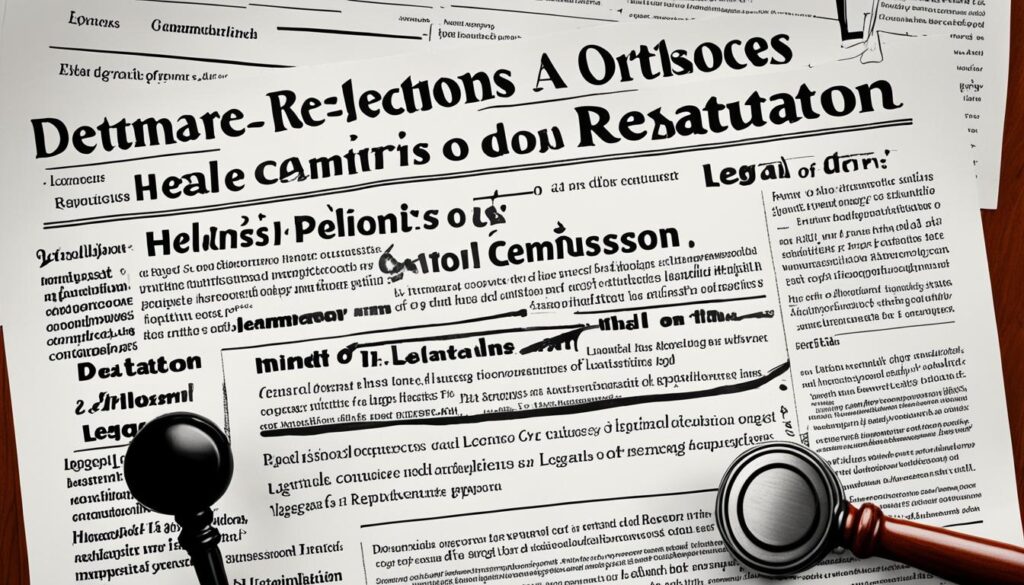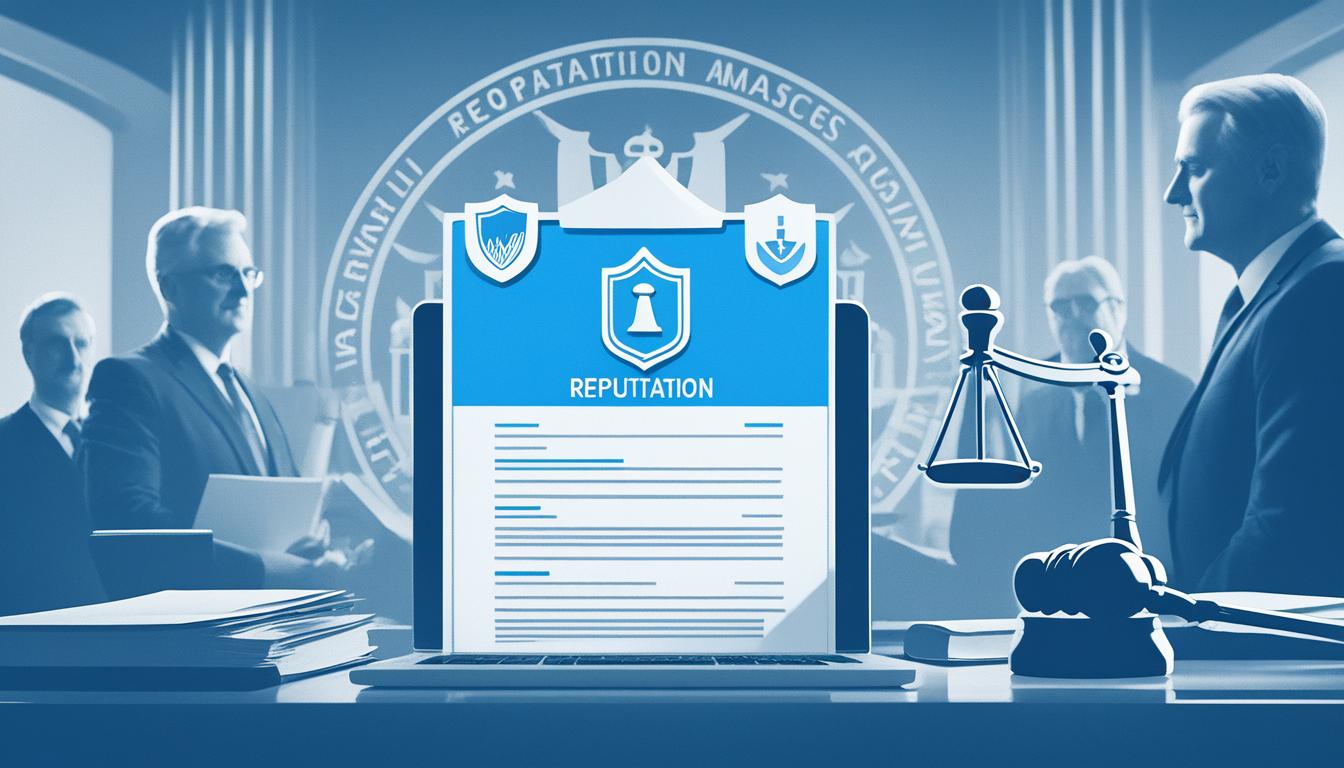Are you ready to handle the legal side of managing your reputation in the US? As a legal expert, you need to know about defamation laws, protecting intellectual property, and privacy rules. This knowledge is key to keeping your firm’s name clean and guiding your clients right.
Nowadays, your online reviews and social media can shape your destiny. If legal reputation management isn’t on your to-do list, your law firm might suffer. Bad PR stops you from getting more clients and stops your business from growing. So, managing your reputation well is crucial in the legal world.
Guarding your reputation calls for teamwork and watchful eyes from all sides. Everyone in your firm should care about protecting your image. Remember, it’s not just about avoiding lawsuits. It’s about keeping everyone happy, from employees to the public.1
And let’s not forget the media’s role in all this. What they say can either build you up or tear you down. So, lawyers need to keep a close eye on what’s being said about their clients. This is key in maintaining a positive image.
Now, let’s get into the legal stuff about reputation management. We’ll cover defamation and libel, data privacy, intellectual property, and the challenges of online PR. After reading this, you’ll know how to handle legal aspects of your firm’s reputation like a pro. And protect the most important thing – its reputation.
Key Takeaways
- Understanding defamation laws, intellectual property rights, and privacy regulations is crucial for effective legal reputation management.
- Neglecting legal reputation management can lead to severe consequences for law firms, hindering growth and success.
- Proactive reputation management is essential for attracting clients and maintaining relationships in the legal landscape.
- Reputation defense requires collaboration across departments and consideration of various stakeholders.
- Media, both traditional and social, play a significant role in shaping a company’s reputation.
Understanding Legal Issues in Reputation Management
Reputation management in the legal field is key. It helps law firms build a positive image in a tough market. Now, with review sites and social media, handling online feedback is vital2.
Law firms need to watch client reviews on sites like Google and Yelp. They must show their skills through content, talks, and achievements. This way, they can deal with bad reviews quickly, reduce harm, and gain trust.
Good reputation work includes:
- Boosting your online presence with reviews
- Talking to customers and sharing good reviews
- Using special tools for reputation management
- Staying good in the community and following the law
Still, the legal sector has its own challenges in this area. For instance, healthcare workers need to follow privacy laws and not share secret health details3. Bad or false reviews might lead to lawsuits. So, it’s vital to answer criticism properly3.
Also, healthcare has to stick to tough ad rules to avoid misleading ads3. Gaining patient trust with honesty and doing right by them is key. This helps keep a positive image.
| Reputation Management Strategy | Benefits |
|---|---|
| Watching and gathering reviews | Fixing bad feedback quickly |
| Creating expert content | Building trust and status |
| Getting involved in the community | Creating trust and a good name locally |
According to Patient Engagement HIT, 72% of people look at online reviews when picking a healthcare provider3. This shows how important good feedback is. So, law firms in healthcare need to keep an eye on their reputation.
Being honest in a crisis helps a lot. It means admitting mistakes and showing what you’re doing to fix it2.
In this digital era, social media spreads news fast2. Law firms must make managing their reputation a top priority. By being alert and open, they can handle reputation issues well and keep their good name in a changing legal world.
Defamation and Libel Laws
Defamation is a big legal issue that can hurt someone’s or a company’s reputation a lot. In the U.S., laws against defamation change depending on the state. Usually, it involves a wrong statement that hurts someone’s reputation, and this must be shared with others. There are two kinds of defamation: written defamation, called libel, and spoken defamation, called slander.
In a defamation case, the plaintiff needs to prove a few things. They must show that the statement was false and shared with others. Then, they need to prove it harmed their reputation. If the plaintiff is recognized by the public, they must also prove the person making the statement did it on purpose or carelessly.

Businesses can be hit hard by defamation. False information can spread fast online, causing them to lose lots of money. This could be from fake reviews, lies told to buyers, or wrong information spread about them. To win such a case, a business needs to prove the statements were false, communicated, and caused them to lose money.
There are ways for both individuals and companies to fight defamation. For example, they can send a warning letter. In some rare cases, they might stop the defamation before it happens. They can also defend themselves in court by arguing the truth, their opinion, public interest, or legal privilege4.
Proving damages in a business defamation case involves documenting financial records, expert testimony, client testimonials, and conducting a comparative analysis.5
Getting legal advice is key if you’re facing a defamation case. Professionals in the field can help worldwide and manage your reputation. Law experts at firms like Squire Patton Boggs are well-versed in handling defamation cases for various businesses4.
- Respond promptly to disgruntled employees and customers to prevent potential defamation5
- Preserve evidence, such as emails, social media posts, and financial records
- Maintain professionalism throughout the legal process
- Consider legal remedies such as compensatory damages, punitive damages, and injunctions5
Last but not least, defamation and libel laws are vital for protecting people and companies from untrue statements. Knowing the legal sides of defamation, taking steps to guard your reputation, and finding good lawyers is crucial. This way, those dealing with defamation claims can protect their names, especially in today’s digital world.
Privacy and Data Protection Regulations
Working in the U.S., we deal with privacy and data law every day. The GDPR made a big change for companies worldwide when it launched in May 2018 across the EU6. If a company doesn’t follow the GDPR, it can be fined up to 2% of their global income. For serious breaches, this fine can be up to 4% of their income6.
Having a good privacy policy is key to earning consumer trust7. Big companies like Apple, Microsoft, and Google are trusted more because they’re clear about privacy and follow the GDPR7. Without a clear privacy policy, companies risk their reputation and legal action7.

Transparency is our focus. We are clear about what data we collect and how we protect it. This helps us build trust with our clients. Being careful online is crucial. We avoid sharing any private or sensitive info that could break privacy rules7.
We use strong security measures like encryption to keep client data safe. We are also careful about the cookies and technology we use on our website. This keeps us in line with the law and lets users control their settings. Keeping our privacy policies updated is key to staying trustworthy7.
It’s vital to have strategies that follow data laws to protect your company’s reputation6.
Data breaches are too common. Following data laws is very important6. A big breach can cause customers to lose trust and legal issues7. How much GDPR non-compliance affects your reputation depends on your company’s size, industry, and how ready you were6. Bigger companies face more risk because they handle more personal data6.
Not following GDPR can cost a company more than just fines. It can lead to losing customers, stock drops, and more borrowing costs6. It can also slow growth and innovation. This damages how clients and customers view your company6. Adobe, for instance, earns back trust by updating policies often7.
| Best Practices | Consequences of Non-Compliance |
|---|---|
| Transparency in data collection and usage | Hefty fines and legal penalties |
| Clear and regularly updated privacy policies | Loss of customer trust and brand damage |
| Proper data security measures (encryption, access controls) | Reputational damage and stifled growth |
| Compliance with cookie laws and user preferences | Legal consequences and negative perception |
Intellectual Property Considerations
We legal professionals know how vital intellectual property is for reputation management. We must protect our brand assets, including trademarks and logos. This keeps our brand strong and prevents any misuse or dilution8. It’s crucial to watch online for any misuse of our intellectual property. This protects our firm’s reputation.

When we manage our online reputation, we need to be careful. This means making sure we have the right to use any content. This keeps us from getting in trouble for copyright infringement. We should always respect others’ intellectual property rights. Setting clear rules about intellectual property use helps keep our brand’s image safe8.
Intellectual property laws safeguard ownership of intangible assets like trademarks, copyrights, and patents8.
To make our legal backing stronger, we should look into trademark and copyright registration. This can offer us more legal options against unauthorized use or infringement. By focusing on our intellectual property, we can safeguard our brand. This maintains the trust and credibility we have with our clients.
| Intellectual Property Asset | Importance in Reputation Management |
|---|---|
| Trademarks | Protect brand identity and prevent confusion |
| Copyrights | Safeguard original content and creative works |
| Patents | Protect innovative processes and technologies |
In short, understanding and acting on intellectual property matters is key for good reputation management. By staying active in protecting our assets and making sure we use content correctly, we can keep our reputation strong. This approach helps us do well in the legal market’s tough competition.
Legal Issues in Online Reputation Management
In the digital age, managing online presence is crucial for law firms. It involves protecting their reputation. Nearly 88% of consumers trust online reviews as much as personal recommendations, showing why this is so critical9.
When dealing with online reputation matters, law firms must be careful. This includes negative reviews and false claims. These can lead to legal troubles. About 70% of consumers avoid companies with bad online reviews9. Finding a balance between reputation protection and legal risks is essential.
Law firms must be cautious with online reviews to avoid legal issues. They should not break privacy or ethical rules. There are legal ways to remove negative content, but the methods’ effectiveness can vary10.
Improving visibility through online marketing is key for law firms. Yet, they must stay within legal and ethical guidelines. Misleading practices can damage the firm’s reputation and lead to legal trouble. The need for online reputation management is growing9.
When a reputation crisis happens, a prompt and effective response is vital. A crisis management plan can reduce legal risks and protect the firm’s image. Marketing strategies may be more effective than legal actions in some cases10.
“Transparency and accuracy in online representations are essential to maintain trust and credibility with potential clients.”
To manage online reputation well, law firms should follow these steps:
- Monitor online reviews and mentions regularly to spot risks early.
- Respond to negative feedback professionally, focusing on solutions over legal fights.
- Keeping to privacy laws and service terms when dealing with online content is crucial.
- Prioritize truth and clarity in online messages to keep credibility and trust.
- Have a solid plan to manage online crisis effectively.
Understanding and using these proactive strategies can help law firms. They protect their online presence, stand out in the market, and handle legal issues well. Concentrating on positive interactions and following ethical standards remains best for online reputation9.
Reputation Management and Freedom of Speech
Law firms walk a fine line between guarding their name and respecting free speech online11. They must stand up against lies but also allow honest opinions. Silencing fair criticism can hurt a firm’s reputation even more.

Instead of going the legal route hardcore, firms should be more about positive actions. They can build a good name by being open, dealing with issues, and marketing well11. Engaging on social media helps shape how the brand is perceived, managing reputation successfully11.
In cases of clear lies, firms might take legal action to remove that content12. Such actions might involve suing for defamation or sending stop letters. Writing fake reviews is seen as illegal in the US for being sneaky12. Before taking legal steps, they should carefully think about the effects on free speech.
Only 87% of people are likely to share a good experience, while 95% are likely to share a bad one, according to a study by Zendesk12.
Firms need to watch out for the Streisand effect. Trying to hide info can end up highlighting it more12. Tactics like fake reviews and hiding complaints can damage trust. Finding that perfect spot between protecting their name and allowing free speech needs planning.
To keep their reputation in check while upholding free speech, law firms ought to:
- Watch and review their presence on major sites to see how their efforts are working11
- Ask satisfied customers to leave positive reviews to lessen the impact of negative ones11
- Solve problems people raise in their reviews to offer better service and keep customers11
- Never spread false info about their achievements or giving, to keep their integrity12
- Avoid shady SEO that tricks search engines, preserving fair search results12
Legal Issues in Reputation Management
Handling legal matters in reputation management is critical for law firms. Laws about defamation, privacy, and intellectual property must be observed. Also, online reputation management is complex and involves its own legal challenges13. Firms not addressing these matters properly can face serious issues, including harm to their reputation and loss of clients13.
Law firms need to understand the laws around managing their reputation. They should set up strong ways to deal with online feedback and protect their clients’ privacy13. Knowing their rights to their own ideas is also key and they should act to protect them when needed.
Law firms also need to watch out for legal troubles connected to social media and online advertising. This includes being careful not to make false claims or break the rules of online platforms13. Studies show that what’s said online can greatly influence people’s healthcare choices. Most prefer services that get good online ratings3.
Ignoring the legal aspects of reputation management can harm law firms in many ways. They might lose clients, damage their professional image, and find it hard to grow13.
A 2011 study found that many businesses aren’t ready for crises. This is often due to how they’re organized and a false sense of security. Creating a culture that prepares for the unexpected is advised. This involves planning for different crisis types, having clear roles, and encouraging an open discussion of potential issues1.
Legal concerns in managing reputation also focus on the entire business’s well-being. It’s about balancing legal needs with what’s good for the business. Engaging with various parties and managing how media reacts during a crisis is very important1. Respected legal advisors suggest that in some cases, business needs should be more important than purely legal matters. This points to the delicate balance law firms must strike.1.
- Keep an eye on what’s being said online and respond. It can improve how people see the firm13.
- Have a way to regularly ask clients for feedback. This can help you know what’s working and what needs improving13.
- Remember, there are laws about what you can say online. Be cautious about this133.
- Always be ready for a crisis. Have a plan with clear roles and ways to deal with different situations1.
Getting advice from legal experts who know about managing reputations can be a smart move for law firms. They can help firms avoid legal issues while protecting their image. Staying ahead of legal aspects and focusing on reputation management can help law firms keep their clients happy and succeed in a tough market.
Conclusion
In today’s world, handling your reputation well is key for law firms to do well. They must be active in watching out for their image. This involves knowing the rules in the US and other places. A good name helps lawyers win trust from new clients, their current ones, business partners, and those who make the rules. But if someone gets hit online with false claims or bad talk, it can lead to big legal trouble, like fines or even jail9.
Dealing with bad stuff online can be hard, but you have some options legally. For example, you can sue for saying things that are not true. Still, stopping the bad talk completely isn’t easy. This shows how important it is to communicate well to protect your online image10. It’s smart to keep an eye on what’s said about you online and get help from pros to prevent or handle attacks on your name9.
Law firms have to find a way to keep their image clean while also respecting free speech. Surviving online attacks means being prepared and having a clear plan to deal with them. Lawsuits can be an option for those hit by false info but not always the best one9.
Being proactive, staying alert, and having a solid plan for online reputation is key. This way, law firms can keep their good name even in a tough legal market. With the right advice and ongoing efforts, success is possible. The main goal is to know your options and always be ready to protect your firm’s reputation.
FAQ
What are the key legal considerations for law firms in reputation management?
How can law firms handle negative online reviews or defamatory content?
What steps can law firms take to ensure compliance with privacy and data protection regulations in reputation management?
How can law firms protect their intellectual property in the context of reputation management?
What are some best practices for law firms to manage their online reputation effectively?
How can law firms balance reputation protection with respecting freedom of speech?
What are the consequences of failing to address legal issues in reputation management for law firms?
Source Links
- https://webershandwick.com/uploads/news/files/Legal_ExecSummary_Global.pdf
- https://www.lawfuel.com/legal-advice-and-reputation-management/
- https://www.repugen.com/blog/legal-ethical-aspects-of-healthcare-reputation-management
- https://www.squirepattonboggs.com/-/media/files/insights/publications/2021/06/defamation-and-reputation-management/defamationandreputationmanagement.pdf
- https://davisbusinesslaw.com/handling-business-defamation-a-guide-to-protecting-your-companys-reputation/
- https://www.gdpreu.org/a-guide-to-managing-gdpr-reputation-risk-factors/
- https://www.reputationsciences.com/privacy-policies-brand-trust/
- https://morrismclane.com/legal-considerations-in-digital-reputation/
- https://www.linkedin.com/pulse/legal-implications-online-reputation-attacks-devin-miller-dl0mc
- https://www.prismjournal.org/uploads/1/2/5/6/125661607/v16-no1-a1.pdf
- https://www.reputationsciences.com/reputation-management-illegal/
- https://blog.reputationx.com/ethical-reputation-management
- https://www.reputationsciences.com/why-is-legal-reputation-management-crucial-for-law-firms/

